Hungarian experts are introducing a one-stop renovation advisory system so that the outdated and energy-intensive domestic residential building stock can be renovated. What do we need to renovate? – At a professional conference entitled ‘The Energy Status of Hungarian Residential Buildings and the Possibilities for Moving Forward’, answers were sought to the financial, technical, social and consumer-related challenges facing the energy renewal of the housing stock today and what solutions exist to overcome them.
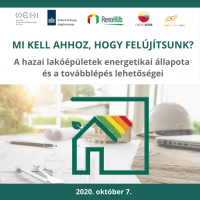
Hungary’s largest energy consumers are buildings, which are responsible for 40 percent of Hungary’s energy demand. A significant reduction in the energy consumption and the achievement of the related domestic and international strategic goals is not possible without a major energy renovation of the building sector, including the largest energy consuming sector, residential buildings.
Domestic residential buildings are very outdated and have a huge potential for energy savings. However, renovation is a lot of hassle, people do not have enough information about it, often they copy bad examples from each other, and many end up getting there, it’s not even worth renovating. A new domestic initiative, the RenoHUb project, helps in this situation, said Gábor Orbán, director of the Energiaklub. What do we need to renovate? – The Hungarian Energy Efficiency Institute (MEHI) organized a professional conference on the energy status of Hungarian residential buildings and the possibilities for further development in cooperation with the Embassy of the Kingdom of the Netherlands and Energy Cities, which was broadcast live from MagNet House.

The conference was opened by René van Hell, Ambassador of the Kingdom of the Netherlands, who reminded that in addition to Hungary, the Netherlands is committed to reducing the effects of the climate crisis, so both countries face the challenge of reducing emissions by up to 55% by 2030. Although much has been done, including the decision to close coal-fired power plants and improve the energy efficiency of buildings, we have a long way to go. He welcomed Reimar von Meding, founder of REIMARKT and KAW (Community Architects), among the speakers at the conference, and revealed that the Dutch government is planning to achieve 1.5% growth in energy efficiency in cooperation with KAW.

Renovators will be assisted by the RenoHUb project
Gábor Orbán spoke about the fact that the RenoHUb project will introduce in Hungary a successful model, the one-stop renovation consulting network, already operating in several places abroad. The long-term goal is to create a nationwide network with consulting offices and an online platform where virtually all information becomes available to prospective renovators. For example, the major steps of a renovation process, what products to choose, a savings calculator, expert database about contractors and energy experts with performance appraisal system and financing options.

The director of the Energiaklub announced that two offices will be opened next year and are constantly waiting for possible collaborators for further ones, emphasizing the role of banks and local governments.
The project is implemented by a five-member consortium, partnering AACM Central Europe, Energiaklub Climate Policy Institute and Applied Communications, IMRO-DDKK Ltd., the Hungarian Family House Owners Association and the Hungarian Energy Efficiency Institute.
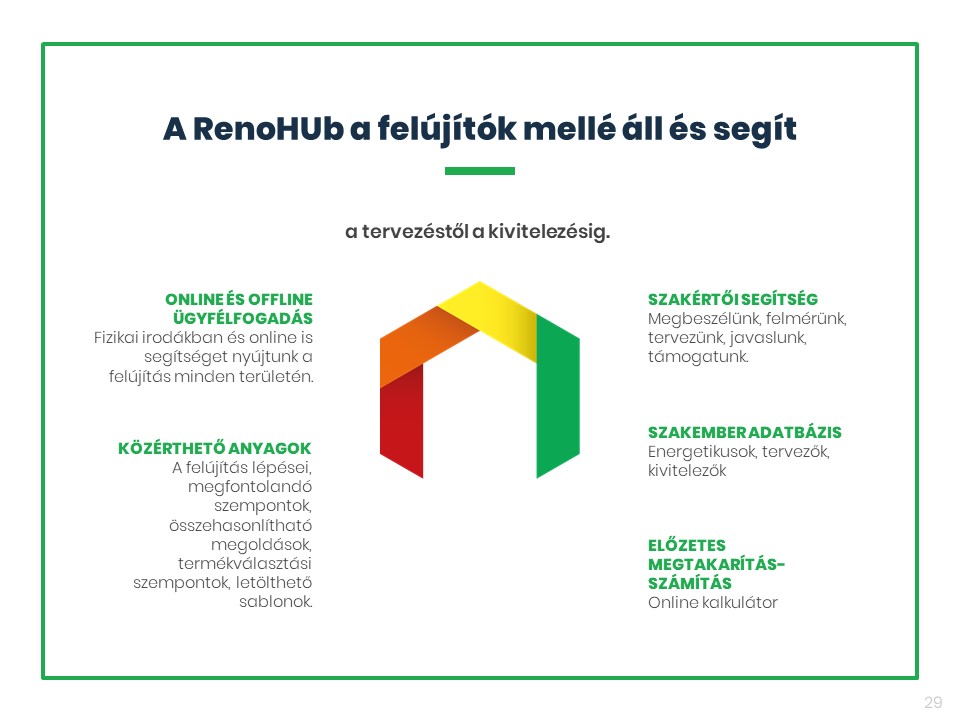
The case of the shoe with the shoelace
Reimar von Meding, who has already implemented a similar model in the Netherlands, gave a live online presentation at the conference. The founder of REIMARKT and CEO of KAW Architecten, spoke about the fact that the Netherlands and Hungary are almost the same in size, but while in the Netherlands it would need to renovate 1,000 residential buildings a day, in Hungary 500 a day to achieve climate neutrality by 2050. One solution to speeding up renovations is the concept of one-stop renovation consulting offices, with the help of which REIMARKT has already renovated 4,000 houses in the Netherlands.

The hard thing about renovations is that at the beginning no one knows exactly how much it will cost in the end, when it will be ready and what the result will be – we wouldn’t buy a loaf of bread or a shoe like this. Especially if it turns out that the shoelaces do not come with it. The solution is to think with the customer’s head. We have to realize that energy renovation itself and its sustainability aspect is not an attractive product and cannot be sold on its own. Reimar von Meding showed how he managed to shorten and streamline customer relationships and the entire renovation process from consulting to construction, and how to reckon with the fact that although they want to sell a sustainability product, they still need to take into account the emotional aspects of the customers. Thus, for example, older people do not want to move into a nursing home, so they are more willing to retrofit the apartment and link that together with energy renovations.
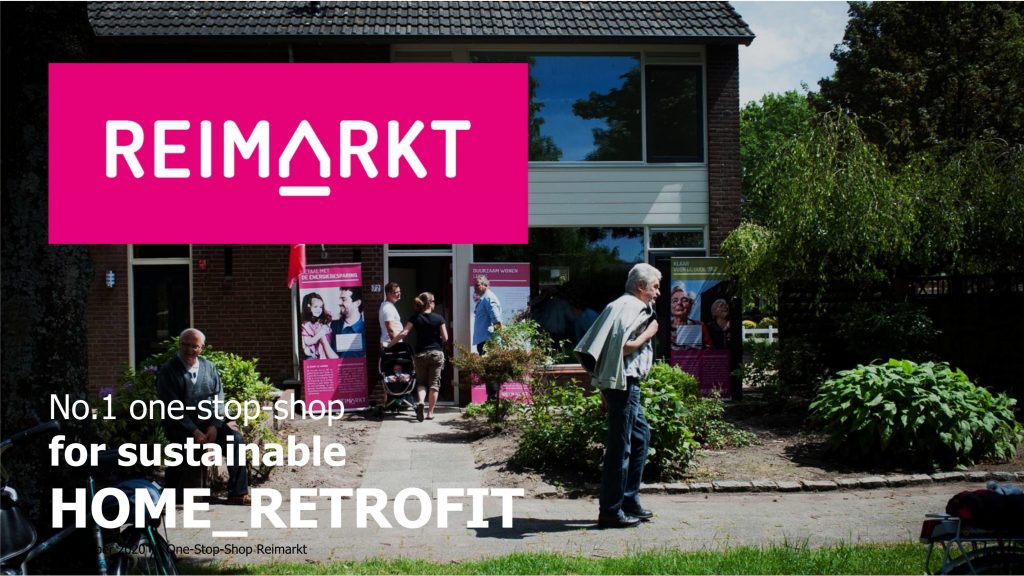
There is great energy saving potential in detached family houses
For the time being, small-scale renovations are typical in Hungary, but they result in energy savings of only 30 percent on average. Moreover, these savings are not reflected at the macroeconomic level. The renovation rate alone is relatively acceptable, but its depth is not enough, it does not always translate into real savings, said Tamás Szórádi, senior project manager of MultiContact Consulting Ltd. Energy can be saved in single-family homes at the lowest cost. After that, small condominiums and prefabricated houses come in line, and adobe houses are the most expensive.

In order to achieve the 2030 energy efficiency targets, it is worth starting the renovation of residential buildings as soon as possible, since according to the cumulative rule, the sooner we renovate our buildings, the more savings can be accounted for. This is important at both European and national level, as it is all part of the National Energy and Climate Plan (NEKT), stressed Tamás Szórádi.
Green financing
Hungary has the 7th highest household energy consumption in the EU. The domestic building stock is considered very outdated, with the rate of energy efficient buildings being one of the lowest in the EU. Róbert Mátrai, Head of the Supervision Team of the Department of Sustainable Finance and Supervisory Internal Regulation of the Hungarian National Bank (MNB), reviewed the tools that banks can use in this area, including green bonds, green funds, green loans and green deposits.
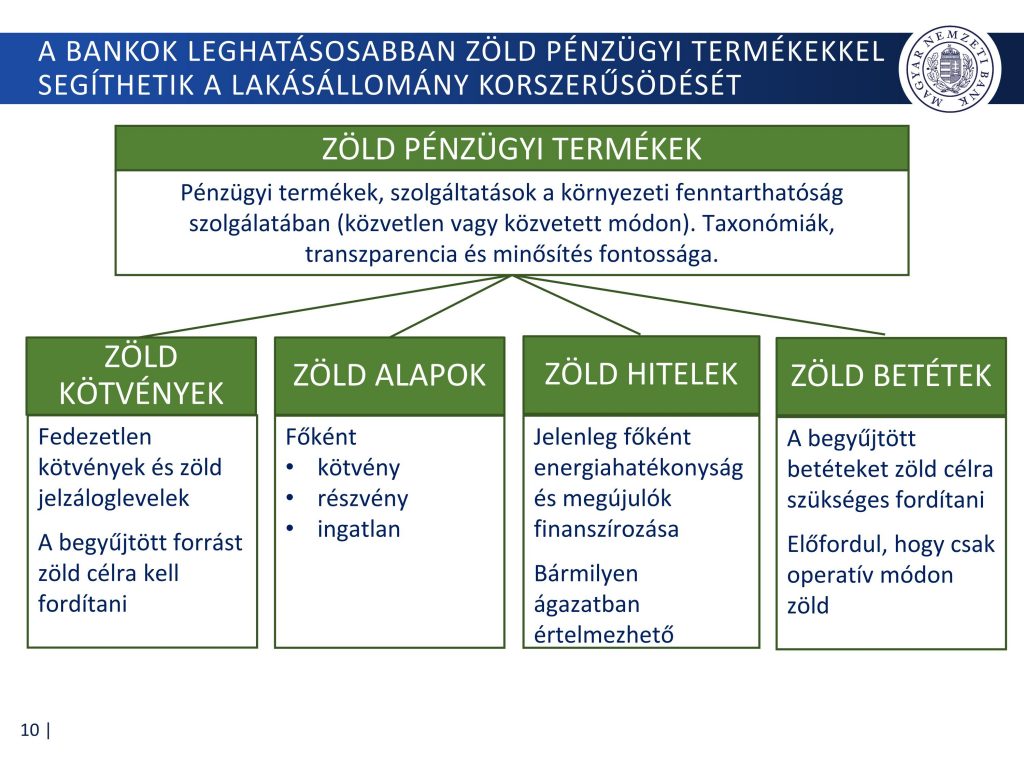
For the time being, green financial products appear minimally in the offer of domestic banks, which is why the MNB has set the goal of stimulating this market. One of the first steps in this is that the MNB announced a preferential capital requirement programme (discount) for credit institutions to support the growth of green financial products and to improve the energy efficiency of the Hungarian building stock. The preferential regulatory treatment will be available for green housing loans granted between 1 January 2020 and 31 December 2023. From the aspect of being eligible for the Discount, those loans shall be regarded energy efficient, which are aimed at the purchase or construction of residential buildings with energy performance rating ‘BB’ or higher.
The demand for energy-efficient properties is constantly growing in Hungary. Energy efficient homes are good investments in times of economic downturn, as the value of the properties is growing faster than that of an average property in times of economic boom. Green properties are expected to have a stable value in the long term, so they can be used more favourably as collaterals. According to the ‘green hypothesis’, there is a lower credit risk on loans taken out for energy efficient homes. Due to lower overhead costs, those living in green properties have a higher disposable income available for repayment, which reduces loans’ probability of default.
The solution: complex renovations
Tamás Versits, a building engineer and expert at Weishaupt Hőtechnika Kft., argued in favor of complex renovations and emphasized that there is no energy modernization without examining the heat generation equipment. He presented a case study where 40 percent energy savings were expected after the insulation of a family house, and the heat demand of the property was actually reduced by that much. Examining the gas bills, however, the company saw that gas consumption had actually increased due to an oversized, not properly adjusted boiler.

He pointed out that in many older residential buildings, where boilers were installed at times when both gas and boilers were very cheap, often a double or triple-capacity boiler was installed. This results in significantly higher gas consumption today. However, the boiler does not always need to be replaced: if it can be modulated in the required range, and if it is regularly maintained and cleaned, it can operate efficiently.
The role of the communities in renovations
István Gulyás, the president of the Association of Hungarian Family House Owners, pointed to the fact that family house owners do not have any meaningful help in planning and carrying out renovations. He founded the Association of Hungarian Family House Owners, which aims to bring together 2.7 million family home owners, and helps them in a new, innovative way, to implement energy efficiency improvements in a bottom-up way.

Home renovation advice and a book entitled Green Home for Everyone written by Mr. Gulyás help families making their homes more efficient. If, on the other hand, they think they also need a more serious investment in energy efficiency, they can achieve significant discounts, cheaper purchase prices, through the strength of the community – critical mass and better advocacy opportunities. Plans for the future include their own discounted financial services for members. The Association will start its membership process in the coming months.
Focus on municipalities
The series of presentations was followed by a panel discussion co-organized by Energy Cities and MEHI in the framework of the Energy Efficiency Watch project, which focused on the role of municipalities in energy efficiency investments; this was moderated by Krisztina Dely from Energy Cities.
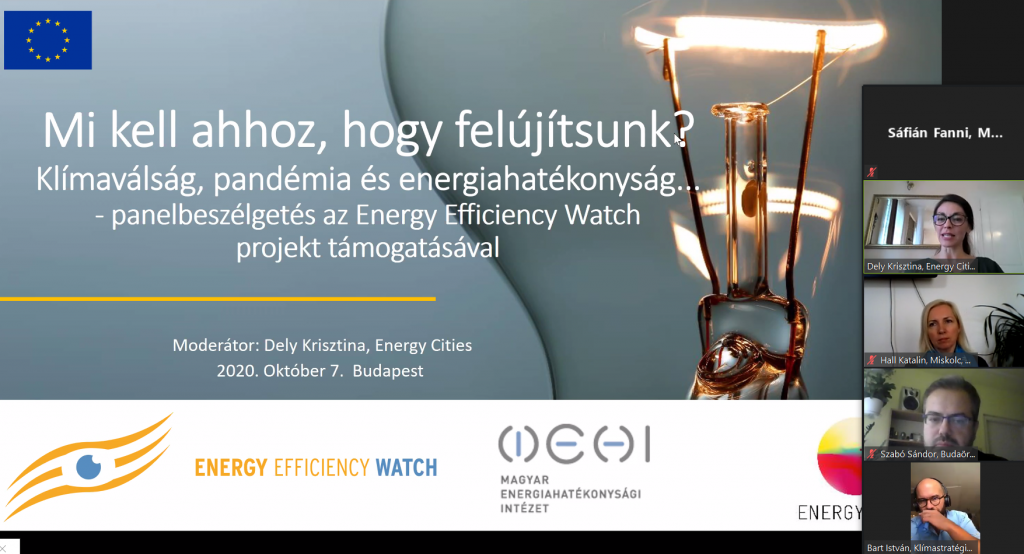
The Energy Efficiency Watch feeds back the opinions and comments of stakeholders and decision-makers about the implementation of EU energy efficiency regulations to EU decision-makers through national roundtables. In the introduction to the panel discussion, Krisztina Dely reminded that the stakes are huge: raising the EU’s 2030 climate targets to 55 percent requires at least doubling the pace of building renovations. This would also be the greatest opportunity not only to tackle the climate crisis but also to recover from the pandemic: energy-efficient renovations create the most long-term jobs and address energy poverty much more effectively than overhead reductions. Currently, one in 4 households in the EU is having difficulty paying their energy bills and this is expected to worsen as the pandemic deepens and unemployment rises.
István Bart, director of the Institute of Climate Strategy 2050 and a member of the board of the Energiaklub, drew attention to the fact that the effects of greenhouse gases are felt about 30 years later than they were emitted, so we can only feel the effects of 1990 emissions. To reduce emissions, we have to imagine a completely different way of life. Unfortunately, the Paris Agreements allow for so many emissions that we cannot guarantee a maximum of 2 °C: they tend to point to a warming of 3-4 degrees, so they are not enough. He pointed out that the Hungarian government had chosen the convenient, painless goal in the new National Energy and Climate Plan (NEKT): the goals set for 2030 will already be achieved with the planned closure of the Mátra power plant and the impact of COVID. Thus, for the planned climate neutrality, we would only have to achieve an emission reduction of 0.5 per cent per year by 2030, and 5 percent per year between 2030 and 2050, which means a shift in tasks beyond the 2030s. Bart sees that non-climate policy has transformed into an appearance climate policy in Hungary.
Ámon Ada, Chief Advisor of Mayor’s Office Budapest, drew attention to the fact that domestic emissions have been rising sharply since 2014, and this process could have been stopped. It is important to see that in the capital, two-thirds of energy consumption is connected with buildings, and 40 percent alone is used in residential buildings, very poorly. However, it also has the city’s greatest emission reduction potential. According to the results of the population survey of the Capital, half of Budapest residents would only start an energy renovation project on their property if they received significant state or municipal support, so solving the issue of financing is now a top priority. At the same time, the first climate community meeting in Budapest put it in the first place, considering the problem of energy efficiency of buildings to be the most serious of all.
Gyula Nagy, President of the Hungarian Chamber of Engineers (MMK), spoke about the fact that this year MMK took over the task of helping residential buildings’renovation through the National Energy Network from government agencies. This will have two important tasks: consulting and ensuring monitoring. At present, the background teams have been set up, the establishment of consulting officies has started, where public and business clients will be able to receive free counseling.
Sándor Szabó, the tender coordinator of the local government of Budaörs, listed how many emission reduction plans, climate plans and projects help Budaörs to do for climate neutrality. They joined the European Covenant of Mayors as early as 2011 and have already met 15% of their 20 percent emission reduction target by 2016. Renovators will be supported with up to HUF 1 million and an energy efficiency consulting office is planned to open. For energy efficiency goals, the Build Upon2 project is also working with other municipalities to increase the number of renovations by creating a multi-level building renovation framework.
Katalin Hall, project manager of the BORA 94 Borsod-Abaúj-Zemplén County Development Agency Nonprofit Ltd., presented an exciting 5-year-old so-called REBUS project aimed at improving policies for energy efficiency renovation of public buildings. As part of this, an energy efficiency renovation route plan was prepared, which contains tips and recommendations for local governments on what to pay attention during renovations, and partners collected 12 international best practices that cover the entire renovation process: design, implementation/construction, monitoring and capacity building. The Hungarian best practice – which also included the energy training of municipal employees in Rácalmás – was identified in capacity building.
Miskolc has been committed to smart and green city initiatives since 2010. Their biggest achievement so far has been the PPP initiative between Miskolc and Pannergy, in the framework of which the district heating system of the Avas Housing Estate has been operating on a geothermal basis for more than 50 percent since 2013. In recent years, 23 public buildings (schools, kindergartens) have been renovated, which can show up to 70 percent energy savings.